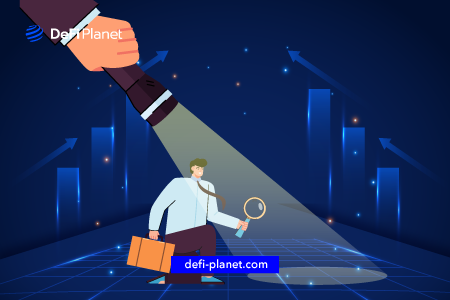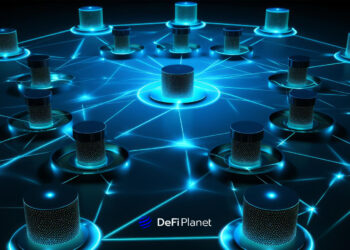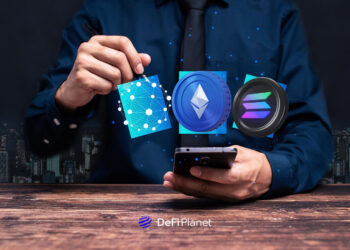Last updated on May 27th, 2025 at 07:24 am
Getting started in decentralized finance (DeFi) can be intimidating. Although the path to financial freedom is exciting and full of limitless possibilities, there is much to learn when first entering this space.
DeFi is evolving rapidly and will significantly impact how several industries and sectors operate. The primary objective of DeFi is to drive financial inclusion by addressing the flaws inherent in traditional finance (TradFi) and providing a more secure and efficient suite of products and services for consumers regardless of their location.
This beginner’s guide explores the fundamentals of DeFi, including how DeFi works, DeFi use cases, the challenges facing DeFi, and popular DeFi projects, amongst others.
What is DeFi?
Decentralized finance (DeFi) is a novel approach to banking and financial services based on peer-to-peer payments and blockchain technology. DeFi enables “trustless” banking via blockchain, eliminating the need to deal with banks or brokers.

DeFi is designed to enable investors to “become the bank” by allowing them to lend money through peer-to-peer networks and earn higher returns than traditional bank accounts. Investors can also move money instantly within and across borders and use digital wallets to access their accounts without incurring exorbitant traditional banking fees.
DeFi aims to help the 1.7 billion people who lack access to basic financial services and to bring open banking through decentralization. With the introduction and use of decentralized finance, the same data held on different computers through peer-to-peer networks would not be vulnerable to a single point of failure.
How Does DeFi Work?
Decentralized finance platforms use smart contracts, which eliminate the need for traditional financial institutions to act as guarantors for transactions. Instead, participants in the decentralized finance ecosystem transact directly with one another, and transactions are secured on the blockchain.
DeFi services enable users to access their funds or assets through a secure digital wallet. Most DeFi products or services do not take custody of user finances, allowing users to retain control over their assets. Smart contracts can be used for transactions in which the user and the other party must agree to a set of specified terms.
A smart contract, for example, can be programmed to send funds to a specific account regularly, which will continue as long as sufficient funds are available. Because a smart contract cannot be changed once it has been created, funds cannot be redirected to another account.
Components of DeFi
DEXs (Decentralized Exchanges)
DEXs allow consumers to exchange digital assets without the involvement of an intermediary or third-party service provider. They enable users to buy and sell digital currency without requiring an exchange account. DEXs enable you to store digital assets outside a centralized platform while still transacting through blockchain transactions from your wallets.
Aggregators and Wallets
Aggregators are the interfaces through which consumers interact with the DeFi market. At their most basic level, they are decentralized asset management systems that automatically transfer users’ crypto assets across several yield-farming platforms to maximize returns.
Wallets are digital asset storage and trading platforms. They can hold multiple assets or just one, and they come in a variety of formats, including software, hardware, and exchange wallets.
Wallets, which store your private keys, can be an important part of DeFi, allowing you to use DeFi platforms in various ways. On the other hand, exchange-based wallets manage your private keys for you, giving you less control and lowering your security risk.
Layer 1
The blockchain on which developers build is referred to as Layer 1.
It is the location where the DeFi apps and protocols are installed.
Although Ethereum is the most popular layer-1 solution in decentralized finance, competitors include Polkadot, BNB, Solana, Tezos, and Cosmos.
These solutions will eventually interact with one another as the DeFi space evolves.
Decentralized Marketplaces
Decentralized markets are a core application of blockchain technology.
They enable users to interact with one another without the use of an intermediary. Although Ethereum is the most popular smart contract platform for decentralized marketplaces, many others allow users to sell or trade assets such as NFTs (non-fungible tokens).
Prediction Markets or Oracles
Oracles use a third-party supplier to bring real-world off-chain data to the blockchain. They paved the way for prediction markets on DeFi crypto platforms, where users can wager on the outcomes of events, with payouts delivered via a smart contract-governed automated procedure.
Benefits of DeFi Apps
Permissionless
DeFi welcomes people from all walks of life, regardless of income, race, culture, wealth, or location, into the financial system. Every user only needs a mobile phone or a computer with internet access.
According to a World Bank report released in 2018, 20% of the global population lacked access to banking services. This is because most unbanked individuals are required to provide KYC (know-your-customer) documentation, such as state-issued identification cards.
In the early stages of DeFi, users can function without any of these. For example, a Maker loan can be obtained without the need for identification or a credit check.
Interoperability
Developers can build on existing protocols, customize interfaces, and connect third-party apps to decentralized accounts. Other DeFi products can be used to create new decentralized money applications. For example, stablecoins, forecast markets, and decentralized trades can be combined to create new and more advanced decentralized financial market products.
Transparency
Because most DeFi protocols are built on the blockchain, all transactions are open to the public. Transactions are visible to anyone, but unlike traditional banks, this data is not directly associated with anyone. Because the source code for most DeFi products is open source, users with programming skills can evaluate and improve it.
Financial Autonomy
DeFi platforms give users complete control over their assets and finances. Although assets must be stored on the platform, users have complete control over what happens to them.
A smart contract replaces the need for human intermediaries to approve loans and manage assets.
Opportunity for innovation
The DeFi market offers viable opportunities for creating and developing DeFi products and services. DeFi, as an open source protocol, has the potential to usher in a new era of financial solutions.
DeFi’s application has increased across several sectors because it is widely compatible with the Ethereum blockchain and enables trailblazers to create new decentralized financial apps.
Popular DeFi Projects
Compound Finance
Compound Finance is a lending and borrowing dApp (decentralized application) that uses blockchain technology. Users can use their crypto as collateral in the compound contract and also borrow against it. Then, it automatically links lenders and borrowers and also changes the interest rate based on supply and demand as well as open lending rules.
Uniswap
Uniswap is a cryptocurrency trading platform based on smart contracts that allow users to trade well-known tokens directly from their wallets. It settles trades around the market price through Automated Market Making. Users can also become liquidity providers and earn a portion of the exchange fees by contributing bitcoin (BTC) to the Uniswap contract.
MakerDAO
Maker is a stablecoin concept in which each stablecoin is tied to the US dollar and backed by crypto as collateral. Entrepreneurs can also create their own DAI stablecoin on the Maker Oasis dApp platform. Maker wants to be more than just a stablecoin project; it wants to be the answer to how DeFi can become a reserve bank.
Others include Augur and PoolTogether.
Challenges Facing The DeFi Sector
Slow performance
Blockchains are fundamentally slower than their centralized counterparts, and blockchain-based applications reflect this. DeFi application developers must consider and optimize their solutions to meet the preferred standards.
High possibility of irrevocable user errors
The responsibility for DeFi applications is transferred from the intermediaries to the user. For many people, this is a disadvantage. When products are built on top of immutable blockchains, designing products that reduce user error becomes even more difficult.
Poor user experience
Using DeFi applications (dApps) currently requires extra effort on the part of the user. If dApps are to become a core component of the global financial system, they must provide tangible benefits that motivate consumers to migrate away from the traditional system.
In Conclusion,
- Decentralized Finance aims to create financial services that will allow for a more open financial system, thereby eliminating censorship and discrimination globally.
- The next generation of applications and services will leverage blockchain technology to reduce transaction costs, improve financial services and security, and provide users with a seamless experience from anywhere on the planet.
- The success of DeFi translates to the transfer of authority from large centralized corporations to the open-source community and individual users.
- Those interested in expanding their knowledge of DeFi beyond the basics of crypto trading should proceed cautiously and only engage with trustworthy platforms.
If you would like to read more articles like this, visit DeFi Planet and follow us on Twitter, LinkedIn, Facebook, and Instagram.
“Take control of your crypto portfolio with MARKETS PRO, DeFi Planet’s suite of analytics tools.”























